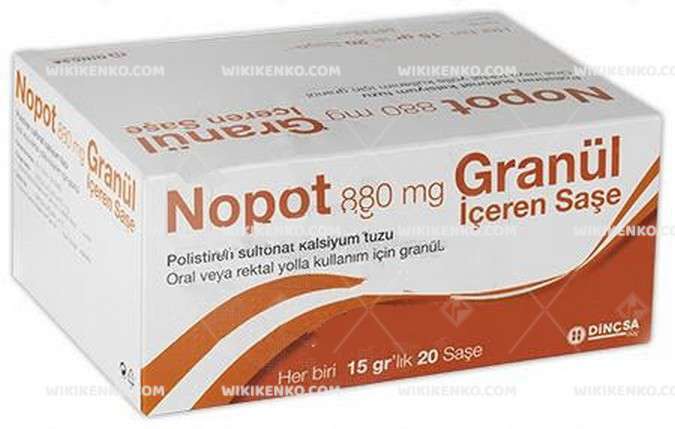Nopot Granul
Nopot Granul is an effective medication for treating high levels of potassium in the blood. It is available in sachets containing 15 grams of Nopot each, and can be taken orally or applied rectally. However, it is important to note the contraindications and precautions when using this medication to ensure its safe and proper use. Regular monitoring of blood calcium and potassium levels is also recommended during long-term treatment. If you have any concerns or questions about the use of Nopot Granul, it is best to consult your healthcare provider.
| Potency | 880 Mg 20X15G |
|---|---|
| Manufacturer | |
| Origin | |
| Generic Name (Ingredient) | 1 Gram Granule Contains 880 Mg Polystyrene Sulfonate Calcium Salt. |
Assuming your emergency circumstances for this product, visit Urgent Quotation page. Besides, for any pharmaceutical questions, please ask us in the comments section.
Description
Usage
Nopot Granul is primarily used to treat high levels of potassium in the blood. It is prescribed for the following:
- Treatment and prevention of high serum potassium levels between dialysis sessions in patients with renal failure
- Treatment of potassium poisoning
Dosage and Administration
The dosage and administration of Nopot Granul depend on the patient’s condition and the healthcare provider’s instructions. The medication is available in sachets containing 15 grams of Nopot each, in boxes of 20, 60, and 120 sachets.
When taken orally, one sachet (15 grams) of Nopot Granul should be mixed immediately with 100 ml of water, milk, tea, or coffee and then consumed.
When applied rectally, two sachets (30 grams) of granules should be dissolved in 100-200 ml of liquid (water or 5% glucose solution) and applied as a retention enema to keep the contents in the intestines for a certain period of time.
Contraindications
Nopot Granul should not be used if:
- The patient is hypersensitive to Nopot or any of its ingredients
- The patient has low levels of potassium in the blood (hypokalemia)
- The patient has high levels of calcium in the blood (hypercalcemia) and accompanying conditions such as excess parathyroid hormone (hyperparathyroidism), bone marrow cancer (multiple myeloma), a disease that affects many organs called sarcoidosis, or spreading cancers (metastatic carcinoma)
- The patient has an obstructive bowel disease
- The patient is a newborn
Precautions
When using Nopot Granul, certain precautions must be taken, including:
- Regular monitoring of blood calcium levels if the patient is following a high-calcium diet or taking other calcium-containing drugs during long-term treatment
- Monitoring of blood potassium levels to prevent it from falling below normal levels
- Caution when using the medication if the patient has a lack of magnesium in the blood (hypomagnesemia)
- Caution when using Nopot Granul if the patient is taking digital drugs used in heart diseases, magnesium-containing laxatives, diuretic drugs, antibiotics containing tetracycline, iron preparations, or anticholinergic drugs
- Not using Nopot Granul together with sorbitol, which is used as a sweetener or laxative
Conclusion
Nopot Granul is an effective medication for treating high potassium levels in the blood. Patients with hyperkalemia can benefit from its use, but it is important to follow the healthcare provider’s instructions and take necessary precautions to avoid any adverse effects. If you are prescribed Nopot Granul, make sure to inform your healthcare provider about any pre-existing medical conditions and medications you are taking to ensure safe and effective treatment.
Use the form below to report an error
Please answer the questions as thoroughly and accurately as possible. Your answers will help us better understand what kind of mistakes happen, why and where they happen, and in the end the purpose is to build a better archive to guide researchers and professionals around the world.
The information on this page is not intended to be a substitute for professional medical advice, diagnosis, or treatment. always seek the advice for your physician or another qualified health provider with any questions you may have regarding a medical condition. Always remember to
- Ask your own doctor for medical advice.
- Names, brands, and dosage may differ between countries.
- When not feeling well, or experiencing side effects always contact your own doctor.
Cyberchondria
The truth is that when we’re sick, or worried about getting sick, the internet won’t help.
According to Wikipedia, cyberchondria is a mental disorder consisting in the desire to independently make a diagnosis based on the symptoms of diseases described on Internet sites.
Why you can't look for symptoms on the Internet
If diagnoses could be made simply from a textbook or an article on a website, we would all be doctors and treat ourselves. Nothing can replace the experience and knowledge of specially trained people. As in any field, in medicine there are unscrupulous specialists, differences of opinion, inaccurate diagnoses and incorrect test results.



Reviews
There are no reviews yet.